Supporting Your Ideas and organize the body of speech
- 格式:ppt
- 大小:121.50 KB
- 文档页数:15
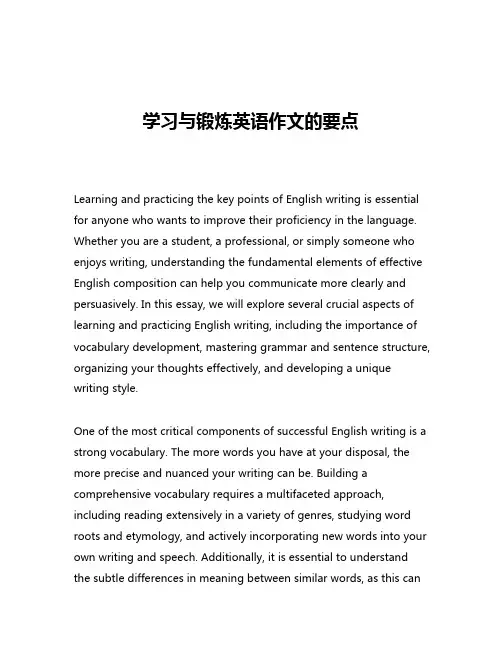
学习与锻炼英语作文的要点Learning and practicing the key points of English writing is essential for anyone who wants to improve their proficiency in the language. Whether you are a student, a professional, or simply someone who enjoys writing, understanding the fundamental elements of effective English composition can help you communicate more clearly and persuasively. In this essay, we will explore several crucial aspects of learning and practicing English writing, including the importance of vocabulary development, mastering grammar and sentence structure, organizing your thoughts effectively, and developing a unique writing style.One of the most critical components of successful English writing is a strong vocabulary. The more words you have at your disposal, the more precise and nuanced your writing can be. Building a comprehensive vocabulary requires a multifaceted approach, including reading extensively in a variety of genres, studying word roots and etymology, and actively incorporating new words into your own writing and speech. Additionally, it is essential to understand the subtle differences in meaning between similar words, as this cangreatly enhance the clarity and precision of your writing.In addition to vocabulary development, mastering the rules of grammar and sentence structure is crucial for effective English writing. Proper use of verb tenses, subject-verb agreement, pronoun usage, and punctuation can make the difference between a well-crafted, polished piece of writing and one that is riddled with errors and difficult to understand. While the intricacies of English grammar can be challenging to learn, consistent practice and a willingness to seek out resources and guidance can help you develop a strong command of these fundamental building blocks of the language.Another key aspect of learning and practicing English writing is the ability to organize your thoughts effectively. This involves developing a clear and logical structure for your writing, whether it is an essay, a report, or a creative piece. This may include crafting a well-structured introduction that clearly states your thesis or main idea, supporting your arguments or points with relevant evidence and examples, and concluding your piece in a way that leaves a lasting impression on the reader. Effective organization not only makes your writing more coherent and easy to follow, but it also helps you to convey your ideas in a more persuasive and impactful manner.In addition to the technical aspects of writing, developing a unique writing style is also essential for successful English composition. Thisinvolves finding your own voice, experimenting with different rhetorical devices and literary techniques, and cultivating a personal approach to the writing process. While it is important to be mindful of the conventions and expectations of different writing genres, embracing your own unique style can help you stand out and engage your readers in a more meaningful way.One effective way to develop your writing style is to read extensively and pay close attention to the writing of authors and thinkers you admire. Analyze the way they use language, the rhythm and flow of their sentences, and the overall tone and mood they create. Then, try to incorporate some of these elements into your own writing, while still maintaining your own unique perspective and approach.Another key aspect of learning and practicing English writing is the importance of seeking feedback and engaging in the revision process. Whether you are working on a school assignment, a professional report, or a personal creative piece, it is crucial to be open to constructive criticism and to be willing to revise and refine your work. This may involve seeking feedback from teachers, peers, or professional editors, and then carefully incorporating their suggestions and insights into your writing.The revision process is not just about fixing grammatical errors or improving the organization of your piece; it is also an opportunity todeepen your understanding of the craft of writing and to hone your skills in conveying your ideas in a more compelling and effective manner. By embracing the revision process, you can develop a greater appreciation for the nuances of language and the power of the written word.Finally, it is important to remember that learning and practicing English writing is an ongoing process, and that there is always room for growth and improvement. Whether you are a seasoned writer or just starting out, it is crucial to approach the task with a spirit of curiosity, humility, and a willingness to learn. This may involve seeking out additional resources, such as writing workshops, online courses, or books on the craft of writing, and continuously challenging yourself to expand your skills and push the boundaries of your own writing abilities.In conclusion, learning and practicing the key points of English writing is a multifaceted and ongoing process that requires a combination of technical skills, creative expression, and a deep appreciation for the power of language. By developing a strong vocabulary, mastering the rules of grammar and sentence structure, organizing your thoughts effectively, and cultivating a unique writing style, you can become a more confident, compelling, and effective communicator in the English language. So, embrace the challenge,seek out feedback and guidance, and never stop learning and growing as a writer.。
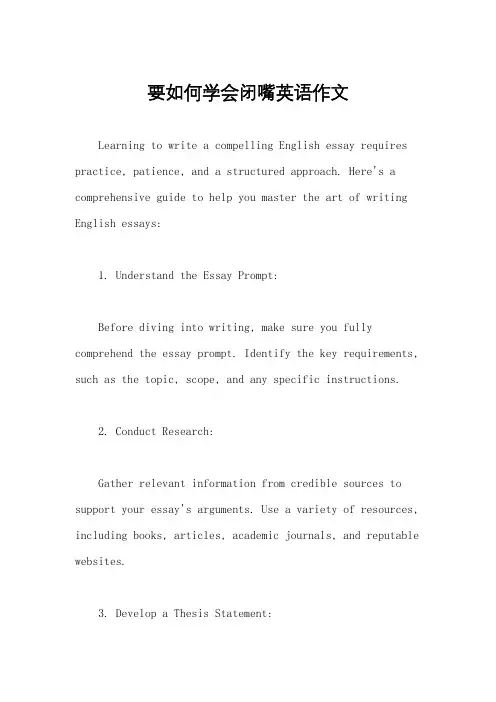
要如何学会闭嘴英语作文Learning to write a compelling English essay requires practice, patience, and a structured approach. Here's a comprehensive guide to help you master the art of writing English essays:1. Understand the Essay Prompt:Before diving into writing, make sure you fully comprehend the essay prompt. Identify the key requirements, such as the topic, scope, and any specific instructions.2. Conduct Research:Gather relevant information from credible sources to support your essay's arguments. Use a variety of resources, including books, articles, academic journals, and reputable websites.3. Develop a Thesis Statement:Craft a clear and concise thesis statement thatoutlines the main argument or perspective of your essay. Your thesis should be debatable and guide the direction of your writing.4. Create an Outline:Organize your ideas and supporting evidence by creating an outline. Divide your essay into introduction, body paragraphs, and conclusion. Each section should have a specific purpose and flow logically into the next.5. Write the Introduction:Begin your essay with an attention-grabbingintroduction that introduces the topic and provides context for your argument. End the introduction with your thesis statement.6. Body Paragraphs:Each body paragraph should focus on a single point that supports your thesis. Start each paragraph with a topic sentence that summarizes the main idea, followed by supporting evidence and analysis. Ensure smooth transitions between paragraphs.7. Incorporate Evidence:Use evidence such as facts, statistics, examples, and quotations to support your arguments. Be sure to cite your sources properly according to the required citation style.8. Analyze and Interpret:Don't just present evidence; analyze and interpret it to demonstrate its relevance to your thesis. Explain how each piece of evidence strengthens your argument and contributes to your overall point.9. Counterarguments:Address potential counterarguments to your thesis andrefute them with evidence and reasoning. Acknowledging opposing viewpoints strengthens your argument and shows critical thinking skills.10. Write the Conclusion:Summarize the main points of your essay in the conclusion, restating your thesis and emphasizing its significance. Avoid introducing new information in the conclusion.11. Revise and Edit:Review your essay for clarity, coherence, and conciseness. Check for grammar, punctuation, and spelling errors. Consider seeking feedback from peers or instructors for further improvement.12. Proofread:Before submitting your essay, carefully proofread it to catch any overlooked mistakes. Reading your essay aloud canhelp identify awkward phrasing or errors.13. Finalize and Submit:Make any necessary revisions based on your proofreading and then submit your essay according to the provided instructions.By following these steps and practicing regularly, you can improve your English essay writing skills and effectively communicate your ideas on paper. Remember to be patient with yourself and seek assistance when needed. Happy writing!。
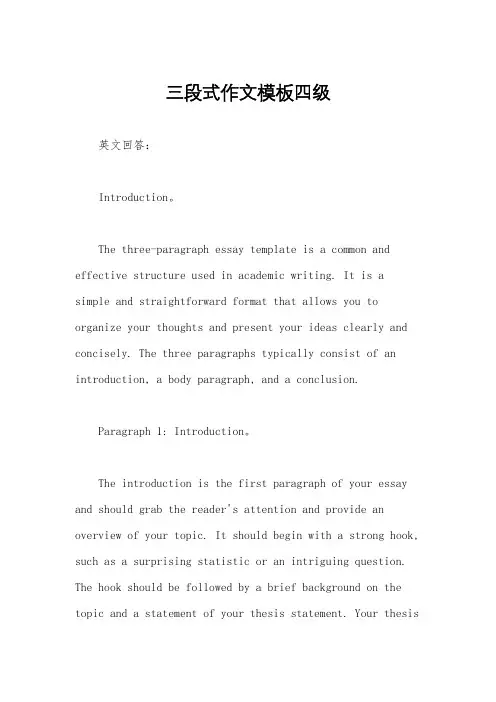
三段式作文模板四级英文回答:Introduction。
The three-paragraph essay template is a common and effective structure used in academic writing. It is a simple and straightforward format that allows you to organize your thoughts and present your ideas clearly and concisely. The three paragraphs typically consist of an introduction, a body paragraph, and a conclusion.Paragraph 1: Introduction。
The introduction is the first paragraph of your essay and should grab the reader's attention and provide an overview of your topic. It should begin with a strong hook, such as a surprising statistic or an intriguing question. The hook should be followed by a brief background on the topic and a statement of your thesis statement. Your thesisstatement should be a clear and concise statement of the main argument or claim that you will be supporting in your essay.Paragraph 2: Body Paragraph。
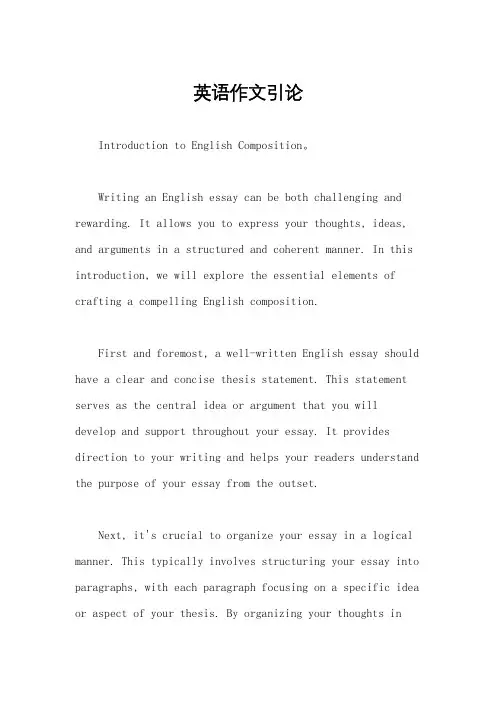
英语作文引论Introduction to English Composition。
Writing an English essay can be both challenging and rewarding. It allows you to express your thoughts, ideas, and arguments in a structured and coherent manner. In this introduction, we will explore the essential elements of crafting a compelling English composition.First and foremost, a well-written English essay should have a clear and concise thesis statement. This statement serves as the central idea or argument that you will develop and support throughout your essay. It provides direction to your writing and helps your readers understand the purpose of your essay from the outset.Next, it's crucial to organize your essay in a logical manner. This typically involves structuring your essay into paragraphs, with each paragraph focusing on a specific idea or aspect of your thesis. By organizing your thoughts inthis way, you can ensure that your essay flows smoothly and that your arguments are presented in a coherent manner.Furthermore, effective use of evidence is essential in supporting your arguments. Whether you're drawing from literary texts, historical events, scientific studies, or personal experiences, providing evidence to back up your claims adds credibility to your essay and strengthens your arguments.Additionally, paying attention to language and style is crucial in creating a compelling English composition. Use precise and vivid language to convey your ideas, and vary your sentence structure to maintain the reader's interest. Moreover, be mindful of your audience and adjust your tone and vocabulary accordingly.Finally, a strong conclusion is essential toeffectively wrap up your essay. Summarize your main points and restate your thesis in a way that leaves a lasting impression on your reader. Avoid introducing new information in the conclusion and instead focus onreinforcing the significance of your arguments.In conclusion, writing an English composition requires careful planning, organization, and attention to detail. By crafting a clear thesis statement, organizing your essay logically, supporting your arguments with evidence, paying attention to language and style, and concluding effectively, you can create a compelling and impactful piece of writing. So, let's embark on this journey of English composition together and explore the power of words!。
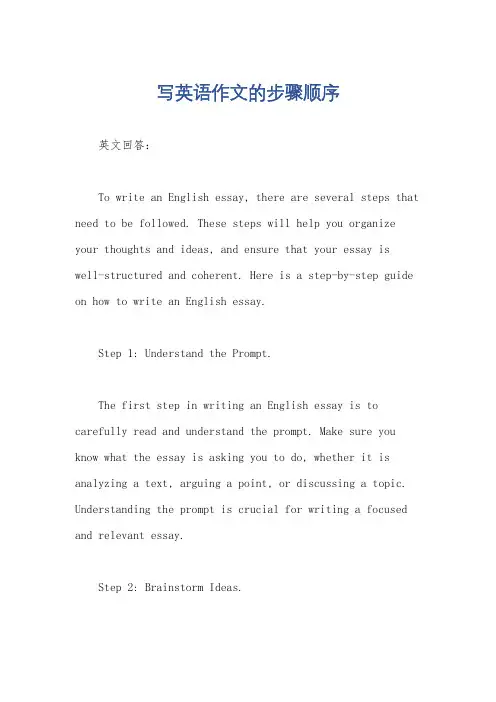
写英语作文的步骤顺序英文回答:To write an English essay, there are several steps that need to be followed. These steps will help you organize your thoughts and ideas, and ensure that your essay iswell-structured and coherent. Here is a step-by-step guide on how to write an English essay.Step 1: Understand the Prompt.The first step in writing an English essay is to carefully read and understand the prompt. Make sure you know what the essay is asking you to do, whether it is analyzing a text, arguing a point, or discussing a topic. Understanding the prompt is crucial for writing a focused and relevant essay.Step 2: Brainstorm Ideas.Once you have understood the prompt, the next step is to brainstorm ideas. Think about the main points or arguments you want to make in your essay. Consider any evidence or examples that support your points. Jot down all your ideas and organize them into a logical order.Step 3: Create an Outline.After brainstorming, create an outline for your essay. An outline will help you structure your essay and ensure that you include all the necessary information. Divide your essay into introduction, body paragraphs, and conclusion. Each section should have a clear purpose and flow smoothly into the next.Step 4: Write the Introduction.The introduction is the first paragraph of your essay and should grab the reader's attention. Start with a hook or an interesting fact to engage the reader. Provide some background information on the topic and end theintroduction with a clear thesis statement that states yourmain argument.Step 5: Develop the Body Paragraphs.The body paragraphs are where you present your main points and provide evidence to support them. Each body paragraph should focus on one main idea and include relevant examples or evidence. Use topic sentences to introduce each paragraph and ensure a smooth transition between paragraphs.Step 6: Write the Conclusion.The conclusion is the final paragraph of your essay and should summarize your main points. Restate your thesis statement and briefly summarize your arguments. End the conclusion with a strong closing statement that leaves a lasting impression on the reader.Step 7: Revise and Edit.Once you have finished writing your essay, take thetime to revise and edit it. Check for any grammatical or spelling errors and ensure that your sentences flow smoothly. Make sure your essay is well-organized and that your ideas are clearly expressed.中文回答:写英语作文的步骤如下:第一步,理解题目。
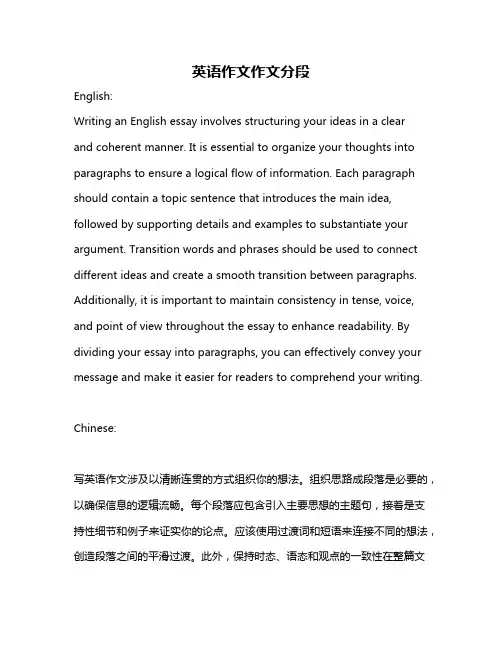
英语作文作文分段English:Writing an English essay involves structuring your ideas in a clearand coherent manner. It is essential to organize your thoughts into paragraphs to ensure a logical flow of information. Each paragraph should contain a topic sentence that introduces the main idea, followed by supporting details and examples to substantiate your argument. Transition words and phrases should be used to connect different ideas and create a smooth transition between paragraphs. Additionally, it is important to maintain consistency in tense, voice, and point of view throughout the essay to enhance readability. By dividing your essay into paragraphs, you can effectively convey your message and make it easier for readers to comprehend your writing.Chinese:写英语作文涉及以清晰连贯的方式组织你的想法。
组织思路成段落是必要的,以确保信息的逻辑流畅。
每个段落应包含引入主要思想的主题句,接着是支持性细节和例子来证实你的论点。
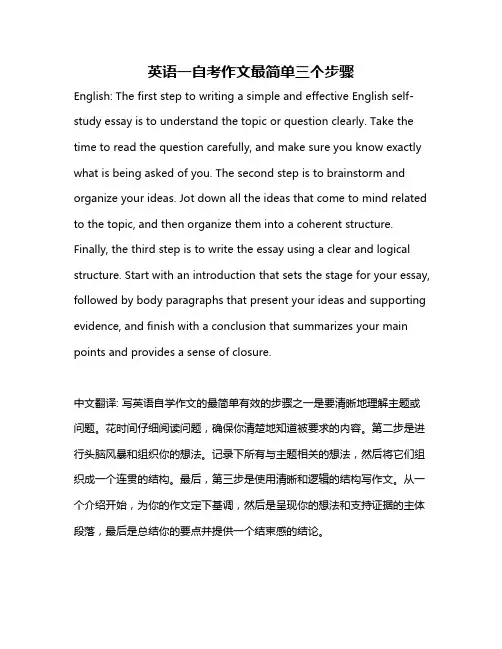
英语一自考作文最简单三个步骤English: The first step to writing a simple and effective English self-study essay is to understand the topic or question clearly. Take the time to read the question carefully, and make sure you know exactly what is being asked of you. The second step is to brainstorm and organize your ideas. Jot down all the ideas that come to mind related to the topic, and then organize them into a coherent structure. Finally, the third step is to write the essay using a clear and logical structure. Start with an introduction that sets the stage for your essay, followed by body paragraphs that present your ideas and supporting evidence, and finish with a conclusion that summarizes your main points and provides a sense of closure.中文翻译: 写英语自学作文的最简单有效的步骤之一是要清晰地理解主题或问题。
花时间仔细阅读问题,确保你清楚地知道被要求的内容。
第二步是进行头脑风暴和组织你的想法。
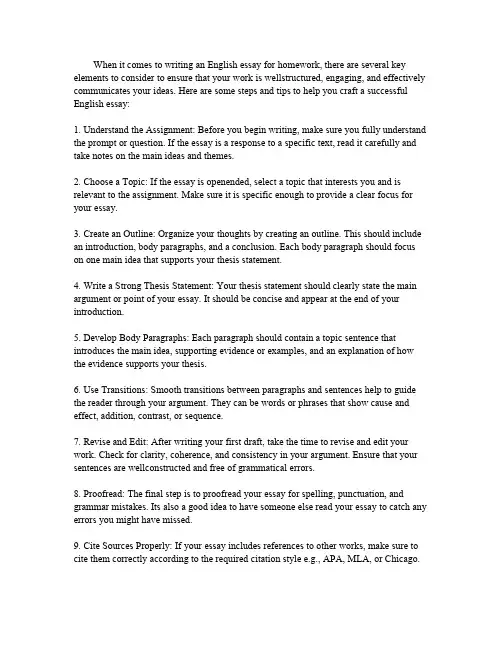
When it comes to writing an English essay for homework,there are several key elements to consider to ensure that your work is wellstructured,engaging,and effectively communicates your ideas.Here are some steps and tips to help you craft a successful English essay:1.Understand the Assignment:Before you begin writing,make sure you fully understand the prompt or question.If the essay is a response to a specific text,read it carefully and take notes on the main ideas and themes.2.Choose a Topic:If the essay is openended,select a topic that interests you and is relevant to the assignment.Make sure it is specific enough to provide a clear focus for your essay.3.Create an Outline:Organize your thoughts by creating an outline.This should include an introduction,body paragraphs,and a conclusion.Each body paragraph should focus on one main idea that supports your thesis statement.4.Write a Strong Thesis Statement:Your thesis statement should clearly state the main argument or point of your essay.It should be concise and appear at the end of your introduction.5.Develop Body Paragraphs:Each paragraph should contain a topic sentence that introduces the main idea,supporting evidence or examples,and an explanation of how the evidence supports your thesis.e Transitions:Smooth transitions between paragraphs and sentences help to guide the reader through your argument.They can be words or phrases that show cause and effect,addition,contrast,or sequence.7.Revise and Edit:After writing your first draft,take the time to revise and edit your work.Check for clarity,coherence,and consistency in your argument.Ensure that your sentences are wellconstructed and free of grammatical errors.8.Proofread:The final step is to proofread your essay for spelling,punctuation,and grammar mistakes.Its also a good idea to have someone else read your essay to catch any errors you might have missed.9.Cite Sources Properly:If your essay includes references to other works,make sure to cite them correctly according to the required citation style e.g.,APA,MLA,or Chicago.10.Follow Formatting Guidelines:Adhere to any formatting guidelines provided by your teacher,such as font size,margins,and line spacing.Remember,practice makes perfect.The more you write,the better you will become at expressing your thoughts clearly and persuasively in English.Dont be afraid to experiment with different styles and structures to find what works best for you.And most importantly,enjoy the process of exploring ideas and sharing your perspective through writing.。
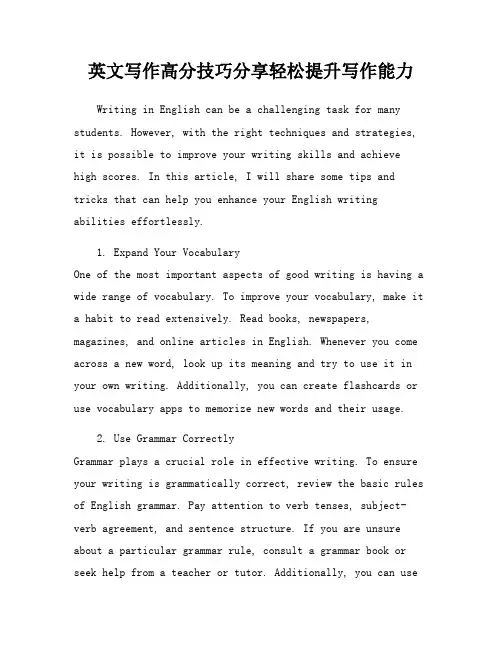
英文写作高分技巧分享轻松提升写作能力Writing in English can be a challenging task for many students. However, with the right techniques and strategies, it is possible to improve your writing skills and achieve high scores. In this article, I will share some tips and tricks that can help you enhance your English writingabilities effortlessly.1. Expand Your VocabularyOne of the most important aspects of good writing is having a wide range of vocabulary. To improve your vocabulary, make it a habit to read extensively. Read books, newspapers, magazines, and online articles in English. Whenever you come across a new word, look up its meaning and try to use it in your own writing. Additionally, you can create flashcards or use vocabulary apps to memorize new words and their usage.2. Use Grammar CorrectlyGrammar plays a crucial role in effective writing. To ensure your writing is grammatically correct, review the basic rules of English grammar. Pay attention to verb tenses, subject-verb agreement, and sentence structure. If you are unsure about a particular grammar rule, consult a grammar book or seek help from a teacher or tutor. Additionally, you can useonline grammar-checking tools to identify and correct any grammatical errors in your writing.3. Practice Writing RegularlyThe key to improving your writing skills is practice. Set aside time each day to write in English. Start with simple exercises such as writing a paragraph about your daily routine or describing a picture. As you become more comfortable, challenge yourself with more complex writing tasks, such as writing essays or opinion pieces. Remember to proofread your writing and make necessary revisions to improve clarity and coherence.4. Develop a Clear StructureA well-structured piece of writing is easier to read and understand. Before you start writing, plan your ideas and organize them into a logical structure. Begin with an introduction that grabs the reader's attention and clearly states your main argument or topic. Then, develop your ideas in the body paragraphs, providing supporting evidence or examples. Finally, conclude your writing by summarizing your main points and offering a final thought or recommendation.5. Use Transition Words and PhrasesTransition words and phrases help to connect ideas and improve the flow of your writing. They signal relationshipsbetween sentences and paragraphs, making your writing more coherent and cohesive. Some common transition words and phrases include "however," "in addition," "on the other hand," and "therefore." Incorporate these words and phrases into your writing to create smooth transitions between ideas.6. Edit and Revise Your WritingAfter completing a draft of your writing, take the time to edit and revise it. Read through your work carefully, checking for spelling mistakes, punctuation errors, and awkward phrasing. Pay attention to the clarity and effectiveness of your sentences and paragraphs. Consider seeking feedback from a teacher, tutor, or native English speaker to get a fresh perspective on your writing. Make necessary revisions to improve the overall quality of your work.7. Read and Analyze Model EssaysTo further enhance your writing skills, read and analyze model essays written by proficient English writers. Pay attention to their writing style, vocabulary usage, and sentence structure. Take note of how they introduce and develop their ideas, as well as how they conclude their essays. By studying well-written essays, you can gaininsights into effective writing techniques and apply them to your own work.In conclusion, improving your English writing skills requires consistent practice and dedication. By expanding your vocabulary, using grammar correctly, practicing regularly, developing a clear structure, using transition words and phrases, editing and revising your work, and studying model essays, you can enhance your writing abilities and achieve high scores in English writing assessments. Remember, the key is to be patient and persistent in your efforts. Happy writing!。
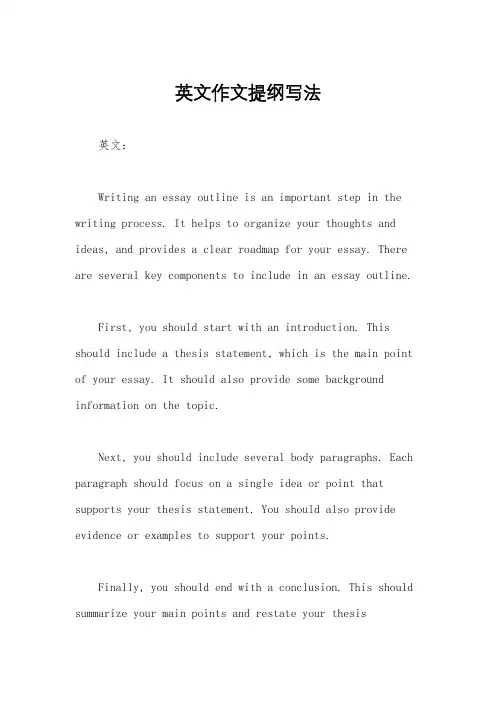
英文作文提纲写法英文:Writing an essay outline is an important step in the writing process. It helps to organize your thoughts and ideas, and provides a clear roadmap for your essay. There are several key components to include in an essay outline.First, you should start with an introduction. This should include a thesis statement, which is the main point of your essay. It should also provide some background information on the topic.Next, you should include several body paragraphs. Each paragraph should focus on a single idea or point that supports your thesis statement. You should also provide evidence or examples to support your points.Finally, you should end with a conclusion. This should summarize your main points and restate your thesisstatement in a new way.Overall, an essay outline is an essential tool for any writer. It helps to ensure that your essay is well-organized and easy to follow.中文:写作提纲是写作过程中的重要步骤。
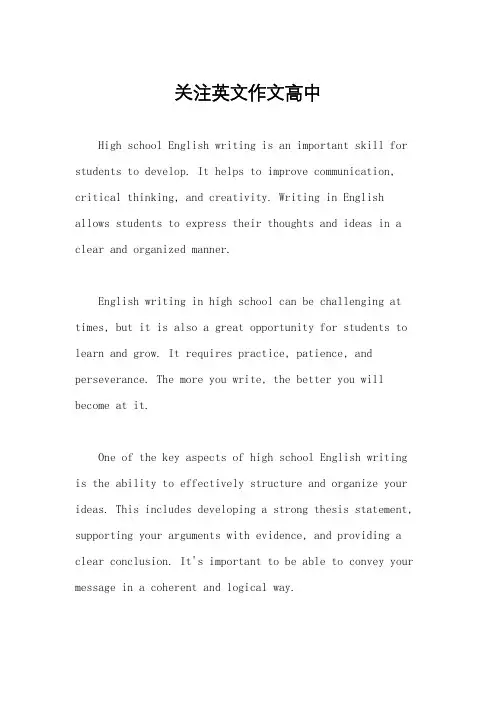
关注英文作文高中High school English writing is an important skill for students to develop. It helps to improve communication, critical thinking, and creativity. Writing in English allows students to express their thoughts and ideas in a clear and organized manner.English writing in high school can be challenging at times, but it is also a great opportunity for students to learn and grow. It requires practice, patience, and perseverance. The more you write, the better you will become at it.One of the key aspects of high school English writing is the ability to effectively structure and organize your ideas. This includes developing a strong thesis statement, supporting your arguments with evidence, and providing a clear conclusion. It's important to be able to convey your message in a coherent and logical way.In addition to structure, high school English writing also requires attention to detail. This means paying close attention to grammar, punctuation, and spelling. These may seem like small details, but they can have a big impact on the overall quality of your writing.Another important aspect of high school English writing is the ability to engage and captivate your audience. This involves using descriptive language, vivid imagery, and compelling storytelling. It's important to be able to connect with your readers and keep them interested in what you have to say.Overall, high school English writing is an essential skill that can benefit students in many aspects of their lives. It's important to approach it with an open mind and a willingness to learn and improve. With practice and dedication, students can become confident and proficient writers.。
英语提纲式作文的好处Writing an English outline essay has many benefits. 提纲式作文是一种非常有益的写作方式。
It provides a clear structure for your thoughts and helps you organize your ideas in a logical manner. 提纲能够清晰地展现你的思路,并帮助你以逻辑的方式组织想法。
By breaking down your main points into smaller subpoints, you can ensure that your essay flows smoothly and is easy to follow. 通过将主要观点细分为更小的子观点,你可以确保你的文章内容流畅,易于理解。
Additionally, writing an outline before actually starting the essay can save you time in the long run. 此外,在正式开始写作之前先制定提纲可以最终为你节省时间。
One of the key advantages of writing an outline essay in English is that it helps you stay focused on the topic at hand. 提纲式作文的一个关键优势是帮助你保持对手头的主题的关注。
It serves as a roadmap for your essay, guiding you through each point you want to make and ensuring that you don't stray off track. 提纲可以作为你写作的路线图,引导你突显每个要表达的点,确保你不偏离主题。
think and write英语作文Thinking and WritingWhen it comes to thinking and writing, it's important to first gather your thoughts and organize your ideas before putting pen to paper. This can involve brainstorming, outlining, or simply taking a few moments to reflect on the topic at hand. Once you have a clear understanding of what you want to convey, it's time to start writing.Writing can be a challenging process, but with practice and dedication, it becomes easier. It's important to have a strong understanding of the topic you're writing about, as well as a clear structure for your piece. This can involve an introduction, body paragraphs, and a conclusion, as well as a focus on grammar, punctuation, and vocabulary.In addition to the technical aspects of writing, it'salso important to consider the tone and style of your piece. Are you writing formally or informally? Are you trying to persuade, inform, or entertain your readers? These considerations can have a big impact on the overall success of your writing.Overall, thinking and writing go hand in hand. By taking the time to carefully consider your thoughts and organize your ideas, you'll set yourself up for success when it comes time to put pen to paper.思考和写作谈到思考和写作,重要的是在动笔之前先整理好自己的思路和想法。
英语作文万能模板写作The Ultimate Essay Template for Unforgettable Writing。
In the realm of academic pursuits, crafting compelling and impactful essays is an essential skill. Yet, navigating the complexities of essay writing can often feel daunting. To guide you through this process, we present the Ultimate Essay Template, a comprehensive framework that empowers you to structure your ideas effectively and express them with clarity and precision.1. Introduction。
a. Hook。
Begin with a captivating hook that grabs the reader's attention and introduces the main topic. This could be a thought-provoking question, an intriguing anecdote, or a startling statistic.b. Background Information。
Provide essential context and background information to establish the framework for your essay. Define key concepts, explain relevant theories, and outline the purpose andscope of your argument.c. Thesis Statement。
英语作文的几大步骤The Steps to Writing an English Essay。
Writing an English essay can be a daunting task, especially for non-native speakers. However, with a clear understanding of the steps involved, anyone can write a successful essay. Here are the steps to follow when writing an English essay:Step 1: Choose a topic。
The first step in writing an English essay is to choose a topic. The topic should be interesting and relevant to the reader. It should also be specific enough to allow for a focused discussion. Once you have chosen a topic, brainstorm ideas and jot them down. This will help you to organize your thoughts and develop a thesis statement.Step 2: Research。
Once you have a topic and a thesis statement, it's time to conduct research. Look for relevant information in books, articles, and online sources. Take notes and keep track of your sources. This will help you to avoid plagiarism and ensure that your essay is well-researched.Step 3: Outline。
怎样学好英语作文范文To excel in English composition, it's crucial to focus on several key aspects: structure, vocabulary, grammar, coherence, and creativity. Here's a detailed guide to help you improve your English writing skills:1. Read Regularly: Reading extensively exposes you to various writing styles, vocabulary, and sentence structures. Read a wide range of materials such as novels, newspapers, essays, and online articles.2. Study Writing Techniques: Analyze well-writtenessays to understand how authors organize their ideas, use transitional phrases, and employ rhetorical devices. Pay attention to sentence variety, paragraph structure, and the balance between description, analysis, and argumentation.3. Expand Vocabulary: Enhance your vocabulary bylearning new words regularly. Use a dictionary orvocabulary-building apps to discover synonyms, antonyms,and idiomatic expressions. Incorporate these words intoyour writing to make it more diverse and engaging.4. Practice Grammar: Review grammar rules and practice writing exercises to improve your grasp of English grammar. Pay attention to sentence structure, subject-verb agreement, verb tense consistency, and punctuation.5. Plan Your Writing: Before you start writing, outline your ideas and organize them logically. Create a clearthesis statement or main argument, and develop supporting points with relevant examples and evidence.6. Focus on Cohesion and Coherence: Ensure that your writing flows smoothly from one idea to the next. Use transitional words and phrases (e.g., however, therefore, moreover) to connect sentences and paragraphs. Check for coherence by ensuring that each paragraph contributes tothe overall argument or theme.7. Edit and Revise: After writing your first draft, revise it carefully. Check for spelling mistakes,grammatical errors, and awkward phrasing. Consider the clarity and effectiveness of your arguments and make revisions as needed.8. Seek Feedback: Share your writing with others, such as teachers, classmates, or online writing communities, and ask for feedback. Constructive criticism can help you identify areas for improvement and refine your writing skills.9. Practice Regularly: Like any skill, writing improves with practice. Set aside time each day or week to write essays on different topics. Experiment with different writing styles and genres to broaden your skills and creativity.10. Learn from Mistakes: Don't be afraid to make mistakes; they are opportunities for learning and growth. Analyze your errors and strive to avoid them in future writing tasks.By incorporating these strategies into your Englishwriting practice, you can gradually enhance your skills and become proficient in composing well-structured and articulate essays. Remember to persevere and stay committed to continuous improvement.。
Writing an English essay in a fourline grid can be an interesting and structured way to organize your thoughts and present them in a clear and concise manner. Heres a stepbystep guide on how to write an English essay in a fourline grid, using a hypothetical topic as an example:Hypothetical Topic: The Impact of Technology on Modern EducationIntroduction 1st LineHook: Start with a thoughtprovoking statement or question that grabs the readers attention. For example, Can you imagine a classroom without computers or the internet?Background: Briefly introduce the topic and its relevance. Mention the rapid technological advancements and their influence on education.Thesis Statement: State your main argument or the central point of your essay. For example, This essay will explore how technology has revolutionized modern education, enhancing learning experiences and expanding access to knowledge.Body Paragraphs 2nd and 3rd LinesParagraph 1 Enhancing Learning ExperiencesTopic Sentence: Introduce the main idea of the paragraph. For example, Technology has significantly improved the learning experience by making it more interactive and personalized.Supporting Details: Provide examples or evidence to support your claim. Discuss the use of multimedia tools, online resources, and adaptive learning software.Transition: Connect this paragraph to the next by hinting at anotheraspect of the topic.Paragraph 2 Expanding Access to KnowledgeTopic Sentence: Introduce the next main idea. For example, Beyond enhancing the learning experience, technology has democratized education by providing access to a wealth of information.Supporting Details: Discuss online courses, open educational resources, and the role of mobile learning in reaching remote areas.Transition: Move to the next paragraph by acknowledging potential drawbacks or challenges.Paragraph 3 Challenges and SolutionsTopic Sentence: Address the flip side of the argument. For example, Despite its benefits, technology in education also faces challenges such as digital divide and information overload.Supporting Details: Discuss the digital divide, the need for digital literacy, and strategies to manage information overload.Transition: Prepare the reader for the conclusion by summarizing the main points.Conclusion 4th LineRestatement of Thesis: Reiterate your thesis statement in a new way. For example, In conclusion, technology has undeniably transformed the landscape of modern education.Summary of Main Points: Briefly summarize the key arguments made in the body paragraphs without introducing new information.Final Thoughts: End with a call to action or a thoughtprovoking statementthat leaves the reader with something to consider. For example, As we continue to integrate technology into education, it is crucial to address the challenges to ensure that all learners can benefit from these advancements.Tips for Writing in a FourLine Grid:Clarity: Ensure each line of your grid serves a distinct purpose and contributes to the overall argument.Cohesion: Use transitional phrases to connect ideas and maintain the flow of your essay.Evidence: Support your claims with relevant examples, statistics, or expert opinions.Structure: Follow a clear and logical structure that guides the reader through your argument.By following this guide, you can effectively organize your thoughts and present a wellstructured essay in a fourline grid format. Remember, the key to a successful essay is a clear thesis, strong supporting evidence, and a coherent flow of ideas.。